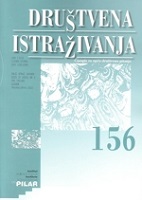Moderacijska uloga spola u odnosu između osjetljivosti na odbijanje i depresivnih simptoma u ranoj odrasloj dobi
The Moderating Role of Gender in the Relation Between Rejection Sensitivity and Depressive Symptoms in Early Adulthood
Author(s): Maja Brekalo, Gordana KerestešSubject(s): Gender Studies, Higher Education , Educational Psychology, Health and medicine and law, Sociology of Education
Published by: Institut društvenih znanosti Ivo Pilar
Keywords: rejection sensitivity; depressive symptoms; gender differences; students; longitudinal research;
Summary/Abstract: Previous studies showed that rejection sensitivity is a predictor of depressive symptoms. However, it is not clear whether gender is a moderator in this relation. This study aims to longitudinally examine the contribution of rejection sensitivity to depressive symptoms in university students and the moderating role of gender in that relation. A longitudinal research with a two-wave data collection five months apart included 277 students (53 male) aged between 18 and 29 years. The results showed that, controlling for the initial level of depressive symptoms, rejection sensitivity predicted the level of depressive symptoms after five months in female but not in male students. Females with higher rejection sensitivity showed higher increase in depressive symptoms in a five- -month period than females with lower rejection sensitivity. The results for females are in line with the rejection sensitivity theory, while the results for males require further research.
Journal: Društvena istraživanja - Časopis za opća društvena pitanja
- Issue Year: 31/2022
- Issue No: 2
- Page Range: 193-212
- Page Count: 20
- Language: Croatian

